二级阅读三合一(33篇)及其答案
- 格式:doc
- 大小:212.00 KB
- 文档页数:30
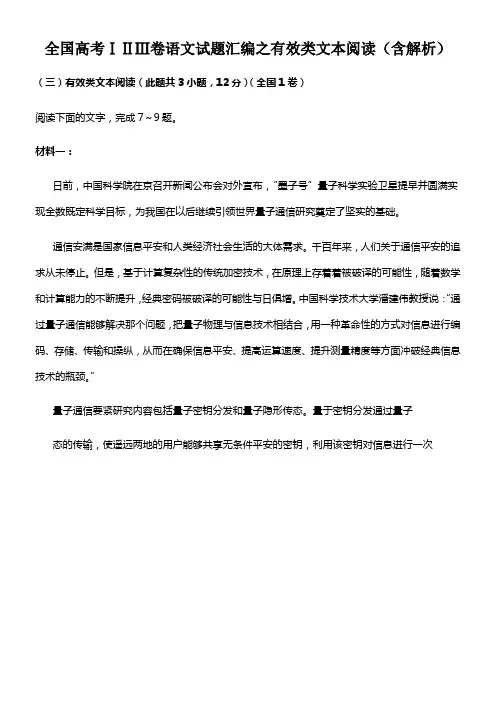
全国高考ⅠⅡⅢ卷语文试题汇编之有效类文本阅读(含解析)(三)有效类文本阅读(此题共3小题,12分)(全国1卷)阅读下面的文字,完成7~9题。
材料一:日前,中国科学院在京召开新闻公布会对外宣布,“墨子号”量子科学实验卫星提早并圆满实现全数既定科学目标,为我国在以后继续引领世界量子通信研究奠定了坚实的基础。
通信安满是国家信息平安和人类经济社会生活的大体需求。
千百年来,人们关于通信平安的追求从未停止。
但是,基于计算复杂性的传统加密技术,在原理上存着着被破译的可能性,随着数学和计算能力的不断提升,经典密码被破译的可能性与日俱增。
中国科学技术大学潘建伟教授说:“通过量子通信能够解决那个问题,把量子物理与信息技术相结合,用一种革命性的方式对信息进行编码、存储、传输和操纵,从而在确保信息平安、提高运算速度、提升测量精度等方面冲破经典信息技术的瓶颈。
”量子通信要紧研究内容包括量子密钥分发和量子隐形传态。
量于密钥分发通过量子态的传输,使遥远两地的用户能够共享无条件平安的密钥,利用该密钥对信息进行一次一密的严格加密。
这是目前人类唯一已知的不可窃听、不可破译的无条件平安的通信方式,量子通信的另一重要内客量子隐形传态,是利用量子纠缠特性,将物质的未知量子态精准传递到遥远地址,而不用传递物质本身,通过隐形传输实现信息传递。
(摘编自吴月辉《“墨子号”,抢占量子科技创新制高点),《人民日报》2017年8月10日)材料二:潘建伟的导师安东·蔡林格说,潘建伟的团队在量子互联网的进展方面冲到了领先地位。
量子互联网是由卫星和地面设备组成的能够在全世界范围分享量子信息的网络。
这将使不可破解的全世界加密通信成为可能,同时也使咱们能够开展一些新的操纵远距离量子联系的实验。
目前,潘建伟的团队打算发射第二颗卫星,他们还在中国的天宫二号空间站上进行着一项太空量子实验。
潘建伟说,以后五年“还会取得很多出色的功效,一个新的时期已经到来”。
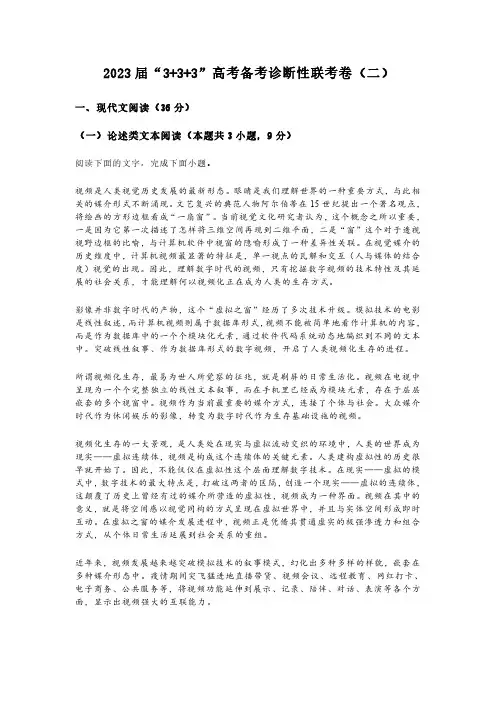
2023届“3+3+3”高考备考诊断性联考卷(二)一、现代文阅读(36分)(一)论述类文本阅读(本题共3小题,9分)阅读下面的文字,完成下面小题。
视频是人类视觉历史发展的最新形态。
眼睛是我们理解世界的一种重要方式,与此相关的媒介形式不断涌现。
文艺复兴的典范人物阿尔伯蒂在15世纪提出一个著名观点,将绘画的方形边框看成“一扇窗”。
当前视觉文化研究者认为,这个概念之所以重要,一是因为它第一次描述了怎样将三维空间再现到二维平面,二是“窗”这个对于透视视野边框的比喻,与计算机软件中视窗的隐喻形成了一种差异性关联。
在视觉媒介的历史维度中,计算机视频最显著的特征是,单一视点的瓦解和交互(人与媒体的结合度)视觉的出现。
因此,理解数字时代的视频,只有挖掘数字视频的技术特性及其延展的社会关系,才能理解何以视频化正在成为人类的生存方式。
影像并非数字时代的产物,这个“虚拟之窗”经历了多次技术升级。
模拟技术的电影是线性叙述,而计算机视频则属于数据库形式,视频不能被简单地看作计算机的内容,而是作为数据库中的一个个模块化元素,通过软件代码系统动态地编织到不同的文本中。
突破线性叙事、作为数据库形式的数字视频,开启了人类视频化生存的进程。
所谓视频化生存,最易为世人所觉察的征兆,就是刷屏的日常生活化。
视频在电视中呈现为一个个完整独立的线性文本叙事,而在手机里已经成为模块元素,存在于层层嵌套的多个视窗中。
视频作为当前最重要的媒介方式,连接了个体与社会。
大众媒介时代作为休闲娱乐的影像,转变为数字时代作为生存基础设施的视频。
视频化生存的一大景观,是人类处在现实与虚拟流动交织的环境中,人类的世界成为现实——虚拟连续体,视频是构成这个连续体的关键元素。
人类建构虚拟性的历史很早就开始了。
因此,不能仅仅在虚拟性这个层面理解数字技术。
在现实——虚拟的模式中,数字技术的最大特点是,打破这两者的区隔,创造一个现实——虚拟的连续体,这颠覆了历史上曾经有过的媒介所营造的虚拟性,视频成为一种界面。
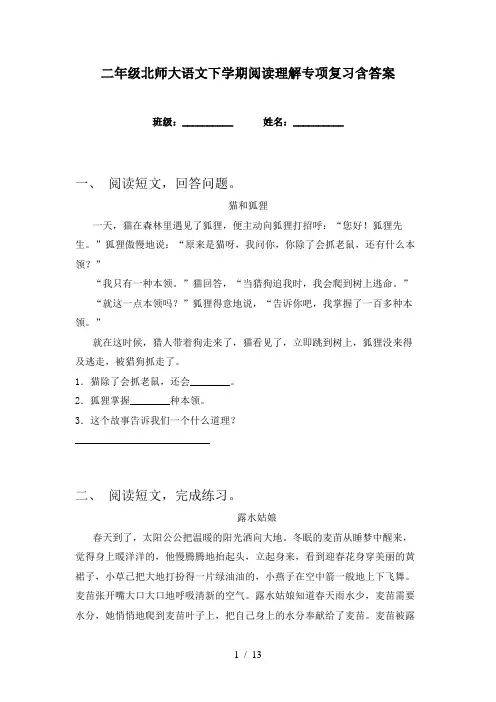
二年级北师大语文下学期阅读理解专项复习含答案班级:__________ 姓名:__________一、阅读短文,回答问题。
猫和狐狸一天,猫在森林里遇见了狐狸,便主动向狐狸打招呼:“您好!狐狸先生。
”狐狸傲慢地说:“原来是猫呀,我问你,你除了会抓老鼠,还有什么本领?”“我只有一种本领。
”猫回答,“当猎狗追我时,我会爬到树上逃命。
”“就这一点本领吗?”狐狸得意地说,“告诉你吧,我掌握了一百多种本领。
”就在这时候,猎人带着狗走来了,猫看见了,立即跳到树上,狐狸没来得及逃走,被猎狗抓走了。
1.猫除了会抓老鼠,还会________。
2.狐狸掌握________种本领。
3.这个故事告诉我们一个什么道理?___________________________二、阅读短文,完成练习。
露水姑娘春天到了,太阳公公把温暖的阳光洒向大地。
冬眠的麦苗从睡梦中醒来,觉得身上暖洋洋的,他慢腾腾地抬起头,立起身来,看到迎春花身穿美丽的黄裙子,小草已把大地打扮得一片绿油油的,小燕子在空中箭一般地上下飞舞。
麦苗张开嘴大口大口地呼吸清新的空气。
露水姑娘知道春天雨水少,麦苗需要水分,她悄悄地爬到麦苗叶子上,把自己身上的水分奉献给了麦苗。
麦苗被露水姑娘助人为乐的精神感动,她用露水姑娘赠给自己的水分湿润了喉咙和全身,顿觉精神起来,恢复了旺盛的生机。
然后说:“谢谢你,露水姑娘。
”风婆婆看到露水姑娘的高尚品质,情不自禁鼓起掌来。
1.从文中找出恰当的词语,填在括号里。
(______)的阳光(______)的黄裙子(______)的空气2.照样子,从文中找出与所给例子类型相同的词语。
绿油油:____________________________3.文中“麦苗张开嘴大口大口地呼吸清新的空气”这句话把_________当作________来写,运用了________的修辞手法。
4.文中的风婆婆为什么给露水姑娘鼓掌?________________________三、课外阅读。
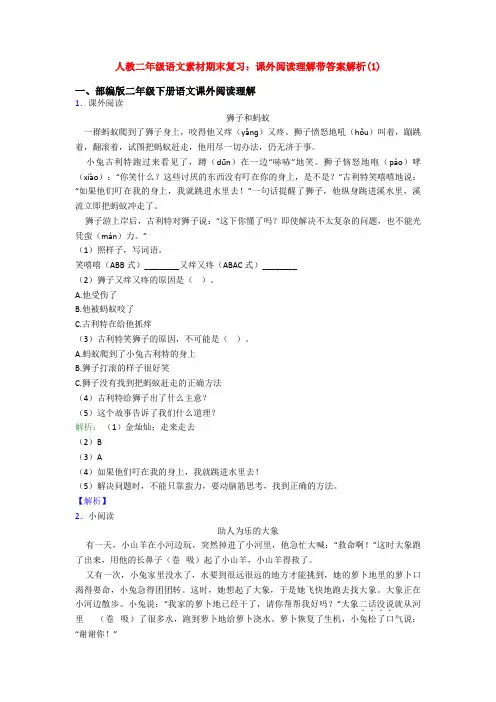
人教二年级语文素材期末复习:课外阅读理解带答案解析(1)一、部编版二年级下册语文课外阅读理解1.课外阅读狮子和蚂蚁一群蚂蚁爬到了狮子身上,咬得他又痒(yǎnɡ)又疼。
狮子愤怒地吼(hǒu)叫着,蹦跳着,翻滚着,试图把蚂蚁赶走,他用尽一切办法,仍无济于事。
小兔古利特跑过来看见了,蹲(dūn)在一边“哧哧”地笑。
狮子恼怒地咆(páo)哮(xiào):“你笑什么?这些讨厌的东西没有叮在你的身上,是不是?”古利特笑嘻嘻地说:“如果他们叮在我的身上,我就跳进水里去!”一句话提醒了狮子,他纵身跳进溪水里,溪流立即把蚂蚁冲走了。
狮子游上岸后,古利特对狮子说:“这下你懂了吗?即使解决不太复杂的问题,也不能光凭蛮(mán)力。
”(1)照样子,写词语。
笑嘻嘻(ABB式)________又痒又疼(ABAC式)________(2)狮子又痒又疼的原因是()。
A.他受伤了B.他被蚂蚁咬了C.古利特在给他抓痒(3)古利特笑狮子的原因,不可能是()。
A.蚂蚁爬到了小兔古利特的身上B.狮子打滚的样子很好笑C.狮子没有找到把蚂蚁赶走的正确方法(4)古利特给狮子出了什么主意?(5)这个故事告诉了我们什么道理?解析:(1)金灿灿;走来走去(2)B(3)A(4)如果他们叮在我的身上,我就跳进水里去!(5)解决问题时,不能只靠蛮力,要动脑筋思考,找到正确的方法。
【解析】2.小阅读助人为乐的大象有一天,小山羊在小河边玩,突然掉进了小河里,他急忙大喊:“救命啊!”这时大象跑了出来,用他的长鼻子(卷吸)起了小山羊,小山羊得救了。
又有一次,小兔家里没水了,水要到很远很远的地方才能挑到,她的萝卜地里的萝卜口渴得要命,小兔急得团团转。
这时,她想起了大象,于是她飞快地跑去找大象。
大象正在小河边散步。
小兔说:“我家的萝卜地已经干了,请你帮帮我好吗?”大象二话没说....就从河里(卷吸)了很多水,跑到萝卜地给萝卜浇水。
萝卜恢复了生机,小兔松了口气说:“谢谢你!”(1)在文中的括号里选出正确的动词。
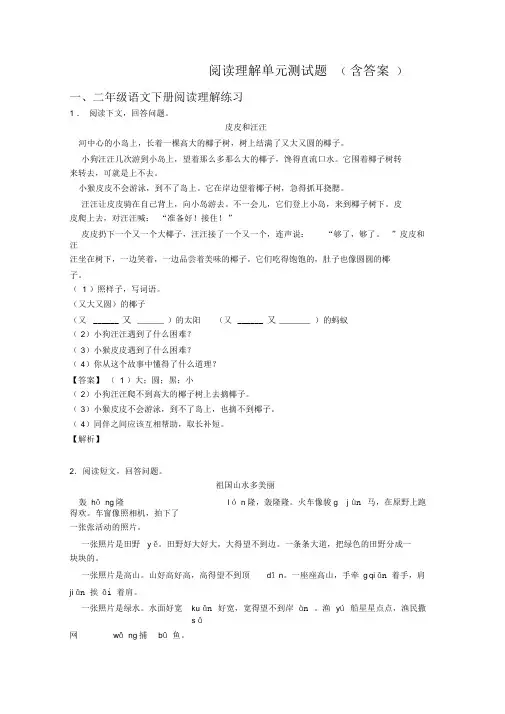
阅读理解单元测试题(含答案)一、二年级语文下册阅读理解练习1 .阅读下文,回答问题。
皮皮和汪汪河中心的小岛上,长着一棵高大的椰子树,树上结满了又大又圆的椰子。
小狗汪汪几次游到小岛上,望着那么多那么大的椰子,馋得直流口水。
它围着椰子树转来转去,可就是上不去。
小猴皮皮不会游泳,到不了岛上。
它在岸边望着椰子树,急得抓耳挠腮。
汪汪让皮皮骑在自己背上,向小岛游去。
不一会儿,它们登上小岛,来到椰子树下。
皮皮爬上去,对汪汪喊:“准备好!接住!”皮皮扔下一个又一个大椰子,汪汪接了一个又一个,连声说:“够了,够了。
”皮皮和汪汪坐在树下,一边笑着,一边品尝着美味的椰子。
它们吃得饱饱的,肚子也像圆圆的椰子。
( 1 )照样子,写词语。
(又大又圆)的椰子(又______ 又______ )的太阳(又______ 又_______ )的蚂蚁(2)小狗汪汪遇到了什么困难?(3)小猴皮皮遇到了什么困难?(4)你从这个故事中懂得了什么道理?【答案】( 1 )大;圆;黑;小(2)小狗汪汪爬不到高大的椰子树上去摘椰子。
(3)小猴皮皮不会游泳,到不了岛上,也摘不到椰子。
(4)同伴之间应该互相帮助,取长补短。
【解析】2.阅读短文,回答问题。
祖国山水多美丽轰hō ng隆l ó n隆,轰隆隆。
火车像骏g j ùn 马,在原野上跑得欢。
车窗像照相机,拍下了一张张活动的照片。
一张照片是田野y ě。
田野好大好大,大得望不到边。
一条条大道,把绿色的田野分成一块块的。
一张照片是高山。
山好高好高,高得望不到顶dǐn。
一座座高山,手牵g qi ān 着手,肩ji ān 挨āi 着肩。
一张照片是绿水。
水面好宽ku ān 好宽,宽得望不到岸àn 。
渔yú 船星星点点,渔民撒s ā网wǎ ng捕bǔ 鱼。
轰隆隆,轰隆隆。
火车像骏马,在原野上跑得欢。
山山水水看不完,祖国山水多美丽!( 1 )照样子,写词语。
例:好宽好宽好 ______ 好______ 好 ________ 好______(2)选字填空。
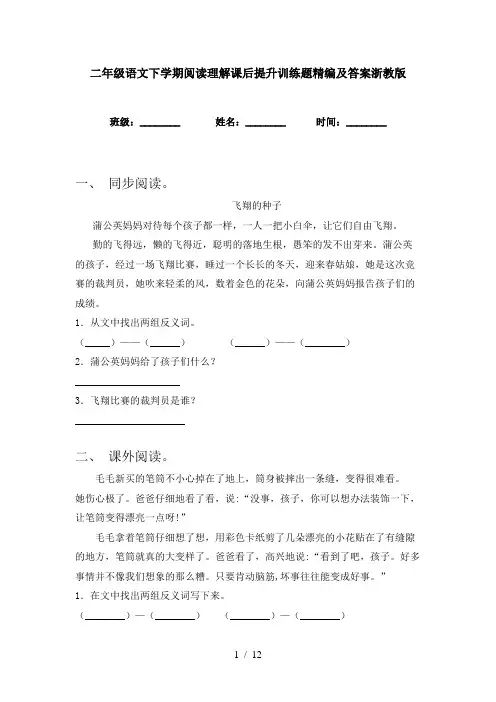
二年级语文下学期阅读理解课后提升训练题精编及答案浙教版班级:________ 姓名:________ 时间:________一、同步阅读。
飞翔的种子蒲公英妈妈对待每个孩子都一样,一人一把小白伞,让它们自由飞翔。
勤的飞得远,懒的飞得近,聪明的落地生根,愚笨的发不出芽来。
蒲公英的孩子,经过一场飞翔比赛,睡过一个长长的冬天,迎来春姑娘,她是这次竞赛的裁判员,她吹来轻柔的风,数着金色的花朵,向蒲公英妈妈报告孩子们的成绩。
1.从文中找出两组反义词。
(_____)——(______)(______)——(________)2.蒲公英妈妈给了孩子们什么?_____________________3.飞翔比赛的裁判员是谁?______________________二、课外阅读。
毛毛新买的笔筒不小心掉在了地上,筒身被摔出一条缝,变得很难看。
她伤心极了。
爸爸仔细地看了看,说:“没事,孩子,你可以想办法装饰一下,让笔筒变得漂亮一点呀!”毛毛拿着笔筒仔细想了想,用彩色卡纸剪了几朵漂亮的小花贴在了有缝隙的地方,笔筒就真的大变样了。
爸爸看了,高兴地说:“看到了吧,孩子。
好多事情并不像我们想象的那么糟。
只要肯动脑筋,坏事往往能变成好事。
”1.在文中找出两组反义词写下来。
(________)—(________)(________)—(________)2.毛毛是怎样装饰笔筒的?用“”画出相关句子。
3.这篇短文告诉我们的道理是( )A.拿东西要多加小心。
B.只要肯动脑筋,坏事往往能变成好事。
三、阅读下面文段,回答问题。
没有熟透的杨梅又酸又甜,熟透了就甜津津的,叫人越吃越爱吃。
我小时候,有一次杨梅吃得太多,感觉牙齿又酸又软,连豆腐也咬不动了。
我这才知道,杨梅虽然熟透了,酸味还是有的,因为它太甜,吃起来就不觉得酸了。
吃多了杨梅再吃别的东西,才感觉到牙齿已经被它酸倒了。
1.照样子写出表示味道的“ABB”式词语。
例:甜津津 ______ ______2.读文段中画横线的句子,说说从哪里可以看出“牙齿又酸又软”。
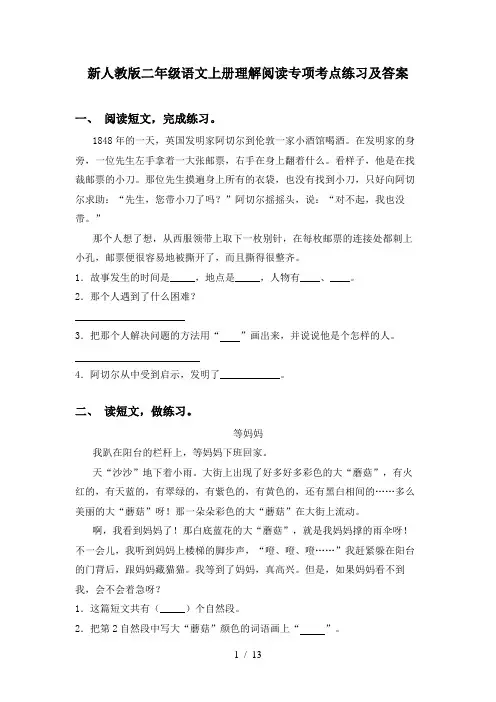
新人教版二年级语文上册理解阅读专项考点练习及答案一、阅读短文,完成练习。
1848年的一天,英国发明家阿切尔到伦敦一家小酒馆喝酒。
在发明家的身旁,一位先生左手拿着一大张邮票,右手在身上翻着什么。
看样子,他是在找裁邮票的小刀。
那位先生摸遍身上所有的衣袋,也没有找到小刀,只好向阿切尔求助:“先生,您带小刀了吗?”阿切尔摇摇头,说:“对不起,我也没带。
”那个人想了想,从西服领带上取下一枚别针,在每枚邮票的连接处都刺上小孔,邮票便很容易地被撕开了,而且撕得很整齐。
1.故事发生的时间是_____,地点是_____,人物有____、____。
2.那个人遇到了什么困难?______________________3.把那个人解决问题的方法用“”画出来,并说说他是个怎样的人。
4.阿切尔从中受到启示,发明了____________。
二、读短文,做练习。
等妈妈我趴在阳台的栏杆上,等妈妈下班回家。
天“沙沙”地下着小雨。
大街上出现了好多好多彩色的大“蘑菇”,有火红的,有天蓝的,有翠绿的,有紫色的,有黄色的,还有黑白相间的……多么美丽的大“蘑菇”呀!那一朵朵彩色的大“蘑菇”在大街上流动。
啊,我看到妈妈了!那白底蓝花的大“蘑菇”,就是我妈妈撑的雨伞呀!不一会儿,我听到妈妈上楼梯的脚步声,“噔、噔、噔……”我赶紧躲在阳台的门背后,跟妈妈藏猫猫。
我等到了妈妈,真高兴。
但是,如果妈妈看不到我,会不会着急呀?1.这篇短文共有(_____)个自然段。
2.把第2自然段中写大“蘑菇”颜色的词语画上“”。
3.下列说法正确的一项是()A.文中的大“蘑菇”指的是雨伞。
B.“我”妈妈撑的雨伞是黑底蓝花的。
C.文中第3自然段写的是妈妈回来时,“我”躲到阳台的门背后找猫咪。
三、享受阅读的乐趣。
一幅作用特殊的画晚上,我正准备画画,爸爸和妈妈不知道为什么吵架了。
爸爸好凶啊,瞪大了眼睛。
妈妈也很厉害,张大了嘴,指手画脚。
我看到了,连忙乖乖地回自己房间画画去了。
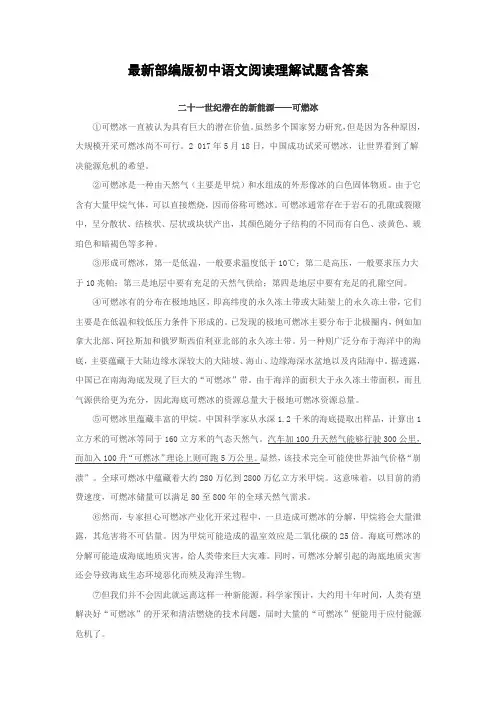
最新部编版初中语文阅读理解试题含答案二十一世纪潜在的新能源——可燃冰①可燃冰一直被认为具有巨大的潜在价值。
虽然多个国家努力研究,但是因为各种原因,大规模开采可燃冰尚不可行。
2 017年5月18日,中国成功试采可燃冰,让世界看到了解决能源危机的希望。
②可燃冰是一种由天然气(主要是甲烷)和水组成的外形像冰的白色固体物质。
由于它含有大量甲烷气体,可以直接燃烧,因而俗称可燃冰。
可燃冰通常存在于岩石的孔隙或裂隙中,呈分散状、结核状、层状或块状产出,其颜色随分子结构的不同而有白色、淡黄色、琥珀色和暗褐色等多种。
③形成可燃冰,第一是低温,一般要求温度低于10℃;第二是高压,一般要求压力大于10兆帕;第三是地层中要有充足的天然气供给;第四是地层中要有充足的孔隙空间。
④可燃冰有的分布在极地地区,即高纬度的永久冻土带或大陆架上的永久冻土带,它们主要是在低温和较低压力条件下形成的。
已发现的极地可燃冰主要分布于北极圈内,例如加拿大北部、阿拉斯加和俄罗斯西伯利亚北部的永久冻土带。
另一种则广泛分布于海洋中的海底,主要蕴藏于大陆边缘水深较大的大陆坡、海山、边缘海深水盆地以及内陆海中。
据透露,中国已在南海海底发现了巨大的“可燃冰”带。
由于海洋的面积大于永久冻土带面积,而且气源供给更为充分,因此海底可燃冰的资源总量大于极地可燃冰资源总量。
⑤可燃冰里蕴藏丰富的甲烷。
中国科学家从水深1.2千米的海底提取出样品,计算出1立方米的可燃冰等同于160立方米的气态天然气。
汽车加100升天然气能够行驶300公里,而加入100升“可燃冰”理论上则可跑5万公里。
显然,该技术完全可能使世界油气价格“崩溃”。
全球可燃冰中蕴藏着大约280万亿到2800万亿立方米甲烷。
这意味着,以目前的消费速度,可燃冰储量可以满足80至800年的全球天然气需求。
⑥然而,专家担心可燃冰产业化开采过程中,一旦造成可燃冰的分解,甲烷将会大量泄露,其危害将不可估量。
因为甲烷可能造成的温室效应是二氧化碳的25倍。
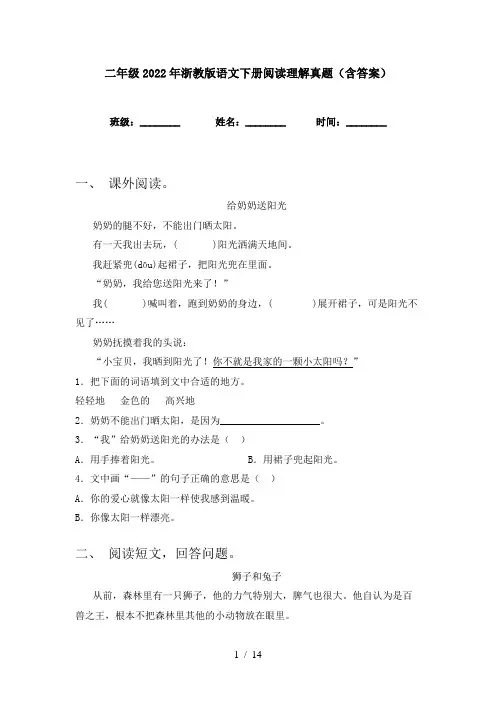
二年级2022年浙教版语文下册阅读理解真题(含答案)班级:________ 姓名:________ 时间:________一、课外阅读。
给奶奶送阳光奶奶的腿不好,不能出门晒太阳。
有一天我出去玩,( )阳光洒满天地间。
我赶紧兜(dōu)起裙子,把阳光兜在里面。
“奶奶,我给您送阳光来了!”我( )喊叫着,跑到奶奶的身边,( )展开裙子,可是阳光不见了……奶奶抚摸着我的头说:“小宝贝,我晒到阳光了!你不就是我家的一颗小太阳吗?”1.把下面的词语填到文中合适的地方。
轻轻地金色的高兴地2.奶奶不能出门晒太阳,是因为____________________。
3.“我”给奶奶送阳光的办法是()A.用手捧着阳光。
B.用裙子兜起阳光。
4.文中画“——”的句子正确的意思是()A.你的爱心就像太阳一样使我感到温暖。
B.你像太阳一样漂亮。
二、阅读短文,回答问题。
狮子和兔子从前,森林里有一只狮子,他的力气特别大,脾气也很大。
他自认为是百兽之王,根本不把森林里其他的小动物放在眼里。
一天,狮子正躺在草丛中懒洋洋地晒太阳,没想到一群红蚂蚁爬到了他身上,咬得他又疼又痒。
狮子跳起来,吼着、蹦着、翻滚着,想把红蚂蚁赶走,可是他累得筋疲力尽,还是赶不走身上的红蚂蚁。
兔子蹲在一边“哧哧”地笑。
狮子恼羞成怒:“笑什么?这讨厌的红蚂蚁没咬你是不是?”兔子笑嘻嘻地说:“如果它们咬我,我就跳进水里去。
”兔子的话提醒了狮子,他纵身跳到河里,河水立即把红蚂蚁冲走了。
兔子说:“这回你明白了吧,光凭力气和发脾气是解决不了问题的。
”1.从文中找出下列词语的近义词。
提示——(______)立刻——(______)2.用“____”画出狮子被红蚂蚁咬后,是怎么做的。
3.这个故事告诉我们()A.狮子不是真正的百兽之王。
B.狮子的办法不如兔子。
C.遇到问题要动脑筋,找到解决的办法。
三、阅读理解。
放小鸟姑妈送我一只小鸟,绿色的羽毛,黄色的嘴巴,一双翅膀扑棱扑棱的,非常可爱。
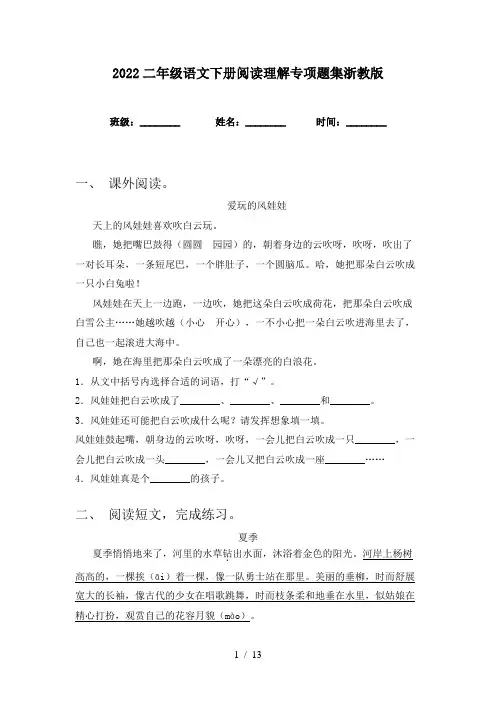
2022二年级语文下册阅读理解专项题集浙教版班级:________ 姓名:________ 时间:________一、课外阅读。
爱玩的风娃娃天上的风娃娃喜欢吹白云玩。
瞧,她把嘴巴鼓得(圆圆园园)的,朝着身边的云吹呀,吹呀,吹出了一对长耳朵,一条短尾巴,一个胖肚子,一个圆脑瓜。
哈,她把那朵白云吹成一只小白兔啦!风娃娃在天上一边跑,一边吹,她把这朵白云吹成荷花,把那朵白云吹成白雪公主……她越吹越(小心开心),一不小心把一朵白云吹进海里去了,自己也一起滚进大海中。
啊,她在海里把那朵白云吹成了一朵漂亮的白浪花。
1.从文中括号内选择合适的词语,打“√”。
2.风娃娃把白云吹成了________、________、________和________。
3.风娃娃还可能把白云吹成什么呢?请发挥想象填一填。
风娃娃鼓起嘴,朝身边的云吹呀,吹呀,一会儿把白云吹成一只________,一会儿把白云吹成一头________,一会儿又把白云吹成一座________……4.风娃娃真是个________的孩子。
二、阅读短文,完成练习。
夏季夏季悄悄地来了,河里的水草钻.出水面,沐浴着金色的阳光。
河岸上杨树高高的,一棵挨(āi)着一棵,像一队勇士站在那里。
美丽的垂柳,时而舒展宽大的长袖,像古代的少女在唱歌跳舞,时而枝条柔和地垂在水里,似姑娘在精心打扮,观赏自己的花容月貌(mào)。
1.短文写了夏天的(______)、(______)、(______)这三种景物。
2.用“”画出文中的一句比喻句,这句话把()比作()。
3.我从文中(______)、(______)、(______)等词语中感受到垂柳像姑娘。
4.“河里的水草钻出水面,沐浴着金色的阳光”,句中动词“钻”用的很好。
下面理解正确的一项是()A.“钻”这个动司让人感受到因为河里泥太多,水草要长出来很费力。
B.“钻”这个动词让人感受到夏天水草偷偷地一下子从河里冒出来,写出了水草的调皮可爱和生机勃勃。
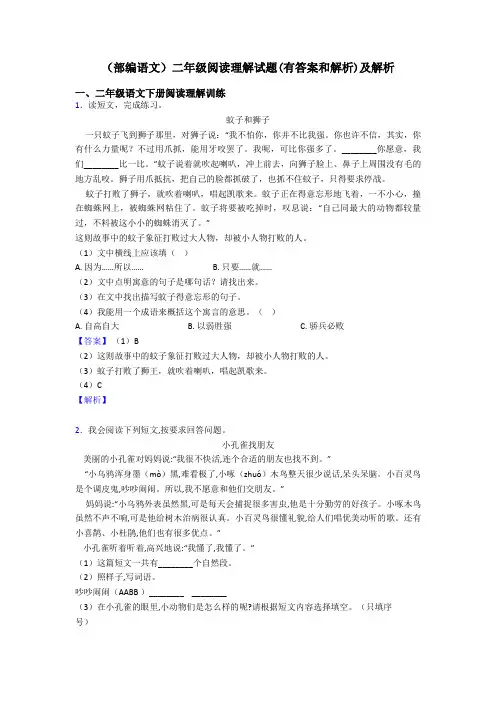
(部编语文)二年级阅读理解试题(有答案和解析)及解析一、二年级语文下册阅读理解训练1.读短文,完成练习。
蚊子和狮子一只蚊子飞到狮子那里,对狮子说:“我不怕你,你并不比我强。
你也许不信,其实,你有什么力量呢?不过用爪抓,能用牙咬罢了。
我呢,可比你强多了。
________你愿意,我们________比一比。
”蚊子说着就吹起喇叭,冲上前去,向狮子脸上、鼻子上周围没有毛的地方乱咬。
狮子用爪抵抗,把自己的脸都抓破了,也抓不住蚊子,只得要求停战。
蚊子打败了狮子,就吹着喇叭,唱起凯歌来。
蚊子正在得意忘形地飞着,一不小心,撞在蜘蛛网上,被蜘蛛网粘住了。
蚊子将要被吃掉时,叹息说:“自己同最大的动物都较量过,不料被这小小的蜘蛛消灭了。
”这则故事中的蚊子象征打败过大人物,却被小人物打败的人。
(1)文中横线上应该填()A. 因为……所以……B. 只要……就……(2)文中点明寓意的句子是哪句话?请找出来。
(3)在文中找出描写蚊子得意忘形的句子。
(4)我能用一个成语来概括这个寓言的意思。
()A. 自高自大B. 以弱胜强C. 骄兵必败【答案】(1)B(2)这则故事中的蚊子象征打败过大人物,却被小人物打败的人。
(3)蚊子打败了狮王,就吹着喇叭,唱起凯歌来。
(4)C【解析】2.我会阅读下列短文,按要求回答问题。
小孔雀找朋友美丽的小孔雀对妈妈说:“我很不快活,连个合适的朋友也找不到。
”“小乌鸦浑身墨(mò)黑,难看极了,小啄(zhuó)木鸟整天很少说话,呆头呆脑。
小百灵鸟是个调皮鬼,吵吵闹闹。
所以,我不愿意和他们交朋友。
”妈妈说:“小乌鸦外表虽然黑,可是每天会捕捉很多害虫,他是十分勤劳的好孩子。
小啄木鸟虽然不声不响,可是他给树木治病很认真。
小百灵鸟很懂礼貌,给人们唱优美动听的歌。
还有小喜鹊、小杜鹃,他们也有很多优点。
”小孔雀听着听着,高兴地说:“我懂了,我懂了。
”(1)这篇短文一共有________个自然段。
(2)照样子,写词语。
2019年普通高等学校招生全国统一考试(新课标Ⅲ卷)语文⼀、论述类⽂本阅读本题共3小题,9分。
阅读下面的⽂字,完成1~3题。
传统表演艺术是我国非物质⽂化遗产的重要组成部分,同时也是⼀座蕴藏丰富、有待进⼀步开发利用的民族民间艺术资源宝库。
经过⼗⼏年的努⼒,⼀些传统表演艺术项目已⾛出困境,呈现出新的⽣机与活⼒,但仍有⼀些项目面临着不容忽视的新问题。
传统表演艺术与普通民众⽣活息息相关,其表演通常具有群体性特征:⽆论侗族⼤歌还是壮族⼭歌,⼈⼈都可展示歌喉;⽆论汉族的秧歌,还是藏民的锅庄,民众欢乐起舞的场面都蔚为⼤观。
对这类非物质⽂化遗产的保护就要坚持其⽣活性、群体性,⽽不应仅局限在艺术团体或演出队等小范围内。
⼴⼤民众为庆贺丰收、祭祖敬神、禳灾祈福⽽载歌载舞的即兴表演,寄托着他们深沉的精神追求和丰富情感。
使传统表演艺术“雅化”,固然能彰显各类民族民间艺术的特⾊,但也弱化了传统表演艺术的民俗⽂化内涵。
当然,各类民间表演艺术经过充分提炼和艺术升华,进⽽搬上舞台,其成功之作会对此类非物质⽂化遗产的传播起到促进作用,如春晚舞台上,藏族舞蹈《飞弦踏春》、蒙古族舞蹈《吉祥颂》等都曾⼤放异彩。
然⽽,在对民间表演艺术进⾏再创作的过程中,有些实施者没有坚持本真性的原则,将⼀些传统艺术改编得面目全非。
比如,有些⼈在改造民乐时套用西⽅音乐编排⽅式,被改编的作品便失了自身的魂魄。
因此,对民族民间传统艺术进⾏“⼆度创作”,应既不失其本真的艺术特性,又科学地融⼊现代元素,适应民众新的审美需求。
要做到这⼀点就需要编导们深谙民间表演艺术的特性,并能进⾏实地调研、采风,挖掘出民间艺术的基本元素与本质精神。
各种传统表演艺术都是在特定时空中呈现的,靠其演出⾏为形成艺术作品,实现艺术价值。
这类非物质⽂化遗产的特性决定了应对其实施活态传承与保护,使之以鲜活形态⽣存于民间。
在非物质⽂化遗产抢救保护实践中,有些地区视保存为保护,重视硬件设施,各类场馆及专题博物馆建设颇具规模,民间收集来的各种乐器、道具、面具、服装等都得到妥善收藏。
第21辑:新高考语基三合一40题(上)(一)阅读下面的文字,完成下面小题。
我门前池塘里的荷花,同燕园其他池塘里的,都不一样。
其他地方的荷花,颜色浅红;而我这里的荷花,不但红色浓,而且花瓣多,每朵花能开出十六个莲瓣,看上去当然就与众不同了。
这些红艳耀目的荷花,高高地凌驾于莲叶之上,迎风弄姿,似乎在睥睨一切。
幼时读旧诗:“毕竟西湖六月中,风光不与四时同。
接天莲叶无穷碧,映日荷花别样红。
”爱其诗句之美,深恨没有能亲自到杭州西湖去欣赏一番。
现在我门前池塘中呈现的就是那一派西湖景象,是我把西湖从杭州搬到燕园里来了。
岂不大快人意也哉!前几年才搬到朗润园来的周一良先生赐名为“季荷”。
我觉得很有趣,又非常感激。
难道我这个人将以荷而传吗?前年和去年,每当夏月塘荷盛开时,我每天至少有几次徘徊在塘边,坐在石头上,静静地吸吮荷花和荷叶的清香。
“蝉嗓林逾静,鸟鸣山更幽。
” 我确实觉得四周静得很。
我在一片寂静中,默默地坐在那里,水面上看到的是荷花的绿肥、红肥。
倒影映入水中,风乍起,一片莲瓣堕入水中,它从上面向下落,水中的倒影却是从下边向上落,最后一接触到水面,二者合为一,像小船似地漂在那里。
1.下列各句中的引号,和文中“季荷”的引号作用相同的一项是()A.几位“大师”捧着几张古画和新画,在欧洲各国一路地挂过去。
B.“包身工”的身体,以一种奇妙的方式包给了带工的老板。
C.散文这种文学体裁的最重要特点就是“形散而神不散”。
D.“满招损,谦受益”这句格言,流传至今已经有两千年了。
2.下列各项中,和画线句子使用的修辞手法相同的一项是()A.朱门酒肉臭,路有冻死骨。
B.足蒸暑土气,背灼炎天光。
C.杨花榆荚无才思,惟解漫天作雪飞。
D.忽如一夜春风来,千树万树梨花开。
3.文中画波浪线的句子可以改写成:“这是大快人意的。
” 从语义上看二者基本相同,为什么说原文表达效果更好?(二)阅读下面的文字,完成小题。
人总是觉得几乎一切鸟都是美的,可爱的。
二年级浙教版语文下册阅读理解教学知识练习含答案班级:__________ 姓名:__________一、阅读课外短文,完成练习。
一根火柴被主人划着,火苗欢舞着,异常兴奋。
远处的风看见火柴纤弱的生命,在顷刻间即将灰飞烟灭,感到十分惋(wǎn)惜,就急速跑过去,一口气吹灭了燃烧的火苗。
熄灭了的火柴被主人扔在地上。
火柴对凤说:“风婆婆,你怎么吹灭了我呀?”风回答:“孩子,我是不忍心看见你的生命那么快就完结了啊!”火柴听后,叹息道:“唉,风婆婆,我的生命最大的价值就在于燃烧啊!可您却扼(è)杀了我短暂(zàn)的生命中的闪光点……”1.给短文加个题目,写在文前的横线上。
2.风为火柴感到惋惜,吹灭了火柴。
它这样做对吗?为什么?_____________________________3.短文反映了火柴什么样的品质?()A.好出风头,想炫耀自己。
B.忘恩负义,别人救了它,还不领情。
C.有牺牲精神,为了照亮别人,不惜毁灭自己。
D.不明事理,不辨是非,不识好人心。
4.你知道生活中像火柴这样的人或物吗?请写一写。
_____________________二、阅读乐园。
一只椰子“生日快乐,卡尔!”外公说着,送给卡尔一件礼物。
“就是一只椰子啊?”卡尔不屑(xiè)一顾地说。
“不要小看这只椰子呀!一只椰子能成为一件很好的礼物啊。
”外公说。
他在椰子上钻了几个眼儿,将椰汁倒进一个杯子。
“好甜!”卡尔喝了一口。
“一只椰子能成为一件很好的礼物啊。
”妈妈说。
她把鸡蛋、牛奶、糖和椰肉混合、搅拌,再放入锅里煮。
很快,椰子蛋奶冒起了气泡。
“好味道!”卡尔吃了一口。
“一只椰子能成为一件很好的礼物啊。
”爸爸说。
他将剩下的椰子壳切成一只碗,打磨光亮,还在碗侧写上卡尔的名字。
“真好看!”卡尔很高兴,“一只椰子能成为三件很好的礼物啊!”1.选文中一共有________个自然段。
2.卡尔收到了______件生日礼物,它们都是_______做的。
2022贵州3+3+3联考2语文答案1、“自怨自艾”“方兴未艾”中的“艾”字读音相同。
[判断题] *对错(正确答案)2、越是进化程度高、智力发达的动物,这种“自我娱乐”的天性越强。
(正确答案)北极熊常常把一根棍子或石块衔上山坡,从坡上扔下来,自己跟在后面追,追上石块或棍子后,再把它们衔上去。
请根据选文的四种假说推测,成年北极熊玩这一游戏的目的可能性最小的会是哪一项[单选题] *适应将来的生存需要。
(正确答案)使自己在生理上、心理上容易保持平衡,是动物天性的表现。
锻炼自己的速度、敏捷能力。
3、下面选项中加着重号字的注音正确的一项是()[单选题] *A、颇多pō外壳ké淤泥yū睥睨pì(正确答案)B、旖旎qí嫌弃xián 招惹rě赐名cìC、洋溢yì萌芽méng 赋予fǔ耀眼yàoD、抗御yù观摩mó堕落duǒ吸吮yǔn4、下面所列《红楼梦》中的信息,对应正确的一项是( ) [单选题] *A.林黛玉潇湘妃子《葬花吟》脖子上有金锁共读《西厢记》B.薛宝钗薛蟠之妹丰年好大雪金玉良缘魁夺菊花诗C.王熙凤贾琏之妻弄权铁槛寺凡鸟偏从末世来协理宁国府(正确答案)D.晴雯宝玉的丫鬟病补雀金裘拒绝给贾赦做妾撕扇子5、43. 下列句子没有语病的一项是()[单选题] *A.一家研究机构的调查结果显示,大约50%左右的人患有“手机依赖症”。
B.能否帮助孩子们树立正确的价值观,是他们形成良好人生观的关键。
C.近日,神舟十三号宇航员在中国空间站为广大青少年带来了一堂精彩的太空科普课。
(正确答案)D.通过“文明学校”创建活动,使每个同学的文明意识显著增强。
6、1我国四大古典名著《水浒传》《三国演义》《西游记》《红楼梦》都是章回体的长篇小说。
[判断题] *对错(正确答案)7、禅的正确读音是()[单选题] *chànshàn(正确答案)chǎnshān8、下列选项中加着重号字的读音和注释全部正确的一项是()[单选题] *A、匪我愆期(读音:yǎn)女也不爽(注释:过失,差错)B、将子无怒(读音:qiāng)以我贿迁(注释:贿赂)C、淇水汤汤(读音:tāng)体无咎言(注释:怪罪)D、渐车帷裳(读音:jiān)自我徂尔(注释:到,往)(正确答案)9、24.下列加点词语注音全部正确的一项是()[单选题] *A.朗润(rùn)应和(yìng)着落(zháo)精神抖擞(sǒu)B.贮蓄(zhù)莅临(1ì)粗犷(kuǎng)咄咄逼人(duō)C.侍弄(shì)分歧(qí)一霎(shà)混为一谈(hùn)(正确答案)D.攲斜(qī)侮辱(wū)难堪(kān)人声鼎沸(dǐng)10、1“文章合为时而著,歌诗合为事而作”是由柳宗元提出的。
人教部编版语文二年级下册试题∶课内外阅读训练(经典版)带答案解析一、部编版二年级下册语文课外阅读理解1.课外阅读狮子和蚂蚁一群蚂蚁爬到了狮子身上,咬得他又痒(yǎnɡ)又疼。
狮子愤怒地吼(hǒu)叫着,蹦跳着,翻滚着,试图把蚂蚁赶走,他用尽一切办法,仍无济于事。
小兔古利特跑过来看见了,蹲(dūn)在一边“哧哧”地笑。
狮子恼怒地咆(páo)哮(xiào):“你笑什么?这些讨厌的东西没有叮在你的身上,是不是?”古利特笑嘻嘻地说:“如果他们叮在我的身上,我就跳进水里去!”一句话提醒了狮子,他纵身跳进溪水里,溪流立即把蚂蚁冲走了。
狮子游上岸后,古利特对狮子说:“这下你懂了吗?即使解决不太复杂的问题,也不能光凭蛮(mán)力。
”(1)照样子,写词语。
笑嘻嘻(ABB式)________又痒又疼(ABAC式)________(2)狮子又痒又疼的原因是()。
A.他受伤了B.他被蚂蚁咬了C.古利特在给他抓痒(3)古利特笑狮子的原因,不可能是()。
A.蚂蚁爬到了小兔古利特的身上B.狮子打滚的样子很好笑C.狮子没有找到把蚂蚁赶走的正确方法(4)古利特给狮子出了什么主意?(5)这个故事告诉了我们什么道理?解析:(1)金灿灿;走来走去(2)B(3)A(4)如果他们叮在我的身上,我就跳进水里去!(5)解决问题时,不能只靠蛮力,要动脑筋思考,找到正确的方法。
【解析】2.阅读短文,回答问题。
石河子秋色秋天来到了新疆,石河子街上的菊花开得正盛,金色与红色居多。
花瓣一层又一层,组成了一个小团,茸茸的,算是一朵又算是千朵万朵,织成一条条带状的花圃(pǔ),绕(rào)着楼,沿着路,静静地闪耀(yào)着它们的光彩。
还有许多荷(hé)兰花,叶小,形状如铜(tónɡ)钱,簇(cù)拥(yōnɡ)着,仰起小脸笑着。
蜜蜂和蝴蝶便专去吻(wěn)它们的脸。
花圃中心常有大片的美人蕉(jiāo)。
小学二年级浙教版语文下册阅读理解专题练习题含答案班级:__________ 姓名:__________一、阅读下文,回答问题马蜂窝一位老农看见大杨树上有个马蜂窝,就拿一只口袋套住马蜂窝,用绳子紧紧系住袋口,扔在树底下,回家吃饭去了。
梅花鹿和羚羊发现了口袋,以为里边有什么好吃的东西,都说是自己先看见的,口袋该归自己。
它们吵起来了,让一只尖耳朵狐狸听见了。
它溜过来,看见梅花鹿、羚羊面前放着一个圆鼓鼓的口袋,心想:里面准是一大块肥肉,足够我吃两顿的。
于是,狐狸眼珠一转,计上心来。
它说:“你们别吵了!我来给你们评评理。
”梅花鹿和羚羊说:“你很聪明,一定有好办法。
我们听你的。
”狐狸一听,高兴极了。
它眯起眼睛清清嗓子,装出一副方正的样子说:“那好吧,你们谁跑得快,口袋就是谁的。
现在就比赛,从这儿跑到小河边再跑回来。
”梅花鹿和羚羊拼命地向小河边跑去。
狐狸得意地打开口袋。
一下子,马蜂全跑出来了,把狐狸蜇得直打滚。
(有改动)1.梅花鹿和羚羊为______而争吵起来。
2.狐狸看到这个口袋,有什么想法?在短文中找出来,画上横线。
3.狐狸用什么方法得到了口袋?(______)4.这个故事告诉我们(___________)二、阅读短文,回答问题。
清晨,湖面上飘着薄薄的雾。
天边的晨星和山上的点点灯光,隐隐约约地倒映在湖水中。
中午,太阳高照,整个日月潭的美景和周围的建筑,都清晰地展现在眼前。
要是下起蒙蒙细雨,日月潭好像披上轻纱,周围的景物一片朦胧,就像童话中的仙境。
1.从语段中找出下面词语的近义词。
清楚——(______)展示——(______)2.读语段,填空。
(1)第一自然段描写了薄雾、_____、_____、湖水这几种景物。
(2)第二自然段的第一句话写的是_____时日月潭的景色,第二句话写的是____时日月潭的美景。
3.这两个自然段是按照()顺序写的。
A.时间(清晨、中午)B.地点(湖面、山上)三、延伸小阅读。
两只蚂蚁争论牛的大小。
阅读练习(1)One day a famous writer was walking along the shore before he began his work. As he looked down the beach, he saw a human figure moving like a dancer. He smiled to himself at the thought of someone who would dance on the beach. So he began to walk faster to catch up.As he got closer, he saw that it was a young man and the young man wasn’t dancing, but instead he was reaching down to the shore, picking up something and very gently throwing it into the ocean.As he got closer he called out, “Good morning! What are you doing?”The young man paused, looking up and replied, “Throwing starfish (海星) in the ocean.”“I guess I should have asked, why are you throwing starfish into the ocean?”“The sun is up and the tide is going out. And if I don’t throw them in they’ll die.”“But, young man, don’t you realize that there are miles and miles of beach and starfish all along it. You can’t possibly make a difference!”The young man listened politely. Then he bent down, picked another starfish and threw it into the ocean, and said, “It made a difference for that one.”There is something very special in each and every one of us. All of us have a natural ability to make a difference.All of us must find our starfish. If we throw our starfish wisely and well, the world will be wonderful.1.Before he began writing, the famous writer was ___D_____.A)enjoying the scene on the beachB)going swimming in the oceanC)having a walk and picking up starfish on the beachD)taking a walk along the shore2.The famous writer found a young man __A______.A)trying to save as many starfish as possibleB)walking along the beach.C)picking up starfish for saleD)dancing along the beach3.In the last paragraph, “our starfish”refers to ____A____.A)our ability to have an effect on the futureB)the strength of imagesC)starfish that the young man threw back to the oceanD)the ability to make decisions4.Which of the following statements is True according to the passage? BA)The young man was unaware of his ability to make a difference for starfish.B)The young man disagreed with the famous writer on the subject of starfish.C)The famous writer thought it impossible to save any of the starfish on the beach.D)The famous writer and the young man shared the same opinion on the subject of starfish.5.This passage tells us that _____B___.A)young people are actually wiser than older peopleB)all of us can help to shape our futureC)famous men are sometimes stupidD)everyone of us is clever(2)There are two men in important positions in my office—Mr. Thompson and Mr. White. Everyone enjoys working with Mr. Thompson, but no one likes Mr. White.Mr. Thompson is always thoughtful and considerate. When he wants something done, he’ll ask, “Would you mind getting this information for me, please?” Mr. White is just the opposite. He usually shouts across the room, “Get me the memorandum, and hurry up.”Mr. White surprised us this morning, though. At first we thought he must be sick. He was king and agreeable. “Miss Erickson,” he asked, “If it’s not too much trouble for you, could you make these telephone calls for m, pleas e?” June Erickson was astonished. Right after that, Mr. White sad, “Miss Reed, would you be so kind as to open the window? It’s quite warm in here.” Then he talked to me. “I’d appreciate it very much if you’d mail these letters for me.”We couldn’t imag ine why he was behaving so strangely. Should we offer him aspirin? Or had Mr. White changed his personality?The situation was soon cleared up. “Ladies,” Mr. Thompson said, “I’ve been told that the president of the company will be here soon. He’s very i nterested in the welfare of his employees and will have some questions to ask you about your working conditions here.”6.What kind of positions do Mr. Thompson and Mr. White have? AA)They both hold important positions in an office.B)One of them holds an important position in an office.C)They both have unimportant positions in an office.D)One of them holds an unimportant position in an office.7.Why does everyone enjoy working with Mr. Thompson? BA)Because he often asks people to do things for him.B)Because he always behaves politely.C)Because he often surprises the office employees.D)Because he usually shouts rudely.8.In dealing with office work, Mr. White acts quite differently from Mr. Thompson in _C_____.A)respecting his company presidentB)considering his opposite positionC)bossing around thoughtlesslyD)addressing people impolitely9.What did people think about Mr. White’s change one morning? They thought __B____.A)Mr. White should be given some aspirinsB)Mr. White must have been either sick or changedC)Mr. White must have been kind and agreeableD)Mr. White should be so kind as to please everyone10.What did Mr. Thompson say to clear up the situation that caused Mr. White’s change? AA)The company’s president was coming to inquire about the employees’ welfare working conditions.B)The employees had written to the company’s president to complain about Mr. White’s behaviors.C)The company’s president had been told about Mr. White bad behaviors in the office of his company.D)The employees highly appreciated Mr. White’s changed behaviors.(3)During the twentieth century there has been a great change in the lives of women. A woman marrying at the end of the nineteenth century would probably have been in her middle twenties. She might have seven or eight children, and four or five of them lived till they were five years old. When the youngest was fifteen, the mother would have been in her early fifties. After this, she could hardly find any work to make money because of the few opportunities and poor health. Today women marry younger and have fewer children. Usually a woman’s youngest child will be fifteen when she is forty-five. She may live another thirty-five years and take paid work until sixty.This important change in women’s lives has also changed women’s economic position. Even a few years ago most girls left school and took a full-time job. However, when they married, they usually left work at once and never came back to it. Today, the school leaving age is sixteen. Many girls stay at school after that age. As women marry younger, more married women will only leave work just before their first child is born, and ma ny of them come back to work soon after. Such changes have made the family life different from before, with the husband having more duties and satisfactions of family life11.Around 1900, women probably got married at the age of ___D_______.A)15B)19C)20D)2512.The text tells us that in the nineteenth century ____C______.A)the mother would be in her early fifties when the children were bornB)a woman usually had five childrenC)the youngest child would live till he or she was five years oldD)4 or 5 children out of 7 or 8 died before they were six years old13.A mother at the end of the nineteenth century would have difficulty in finding work___D______.A)because she wanted to make moneyB)when her youngest child was bornC)because she was forty-five years oldD)when her youngest child was about fifteen14.One reason why today’s mothers take jobs again is that they ____D______.A)want to live another thirty-five yearsB)don’t like ch ildren themselvesC)needn’t worry about money for the familyD)are still young when the youngest child is fifteen15.One difference between the women today and those a few years ago is that ____D____.A)today’s women marry very youngB)many women today stop working as soon as they get marriedC)today’s women have only one childD)many women today start to work again after their first child is born(4)Long ago there was no money. It was hard for people to get the things they needed. They couldn’t just go to a store. First they had to find someone who had what they wanted. Then they had to give that person something he or she wanted. That’s how goods were traded.Trading means giving something to get something else. One farmer might have many apples, but no milk. Another farmer might have a lot of milk, but no apples. The first farmer gives the otherfarmer some apples. The other farmer gives the first farmer some milk for the apples. Then both are glad.Trading goods was hard work. It took a lot of time. Soon someone thought of using money instead of goods. In the old days money could be anything. People have used shells, little rocks, gold, and silver as money.Later, coins were used as money. The first coins were made of gold and silver. Now they are made out of many different metals. Money today is also made out of something that can be folded. It’s made out of paper. Today most of our money is bills.Most people do some kind of work to get money. With that money, they can buy the things they want and need. This could be food, a car, or a trip. They can also save some. They would do this by putting it in a bank. Then they would have it later on to pay for things like their children’s schooling. Money is very important.16.The passage mainly tells about money’s_A__.A)importanceB)convenienceC)functionD)history17.In a store today people can_D__.A)get something by giving something elseB)give things to those who want themC)find those who need the goodsD)get things by paying bills18.Which of the following objects can be bent? DA)CoinsB)ShellsC)RocksD)Bills19.“They can also save some”in the last paragraph means__D_.A)they can keep their goods from being damagedB)they can keep some goods they needC)they can keep money from getting rottenD)they can keep some money for later use20.According to this passage, all of the following statements are true EXCEPT that_D__.A) money is very important in tradeB)with the development of trade money appearedC)today money can be made of paper or metalsD)at first goods were traded with money(5)Advertising is one of the biggest businesses in America. Madison Avenue in New York is a well-known place where many advertising companies have their offices.Many different companies sell cars; many others sell oil. Many different companies sell clothes, tires, and so on. Each company wants the public to buy its products. By advertising these companies make the public interested in what they want to sell.Each company pays advertisers to tell the public about its products. Suppose a company has a new breakfast cereal (谷类食物)to sell. In an advertising office on Madison Avenue plans are made for telling the public about this product. The advertising company takes beautiful pictures ofpeople eating the cereal. These pictures appear in newspapers or magazines, and also on TV.Here is an example of a TV advertisement telling the public about the new breakfast cereal: Picture: a well-known basketball player eating a big bowl of WAKE-UPS with a W AKE-UPS box beside him on the table.Basketball Player: I always start my day with WAKE-UPS, the cereal made especially for people like me. I have to have good health. WAKE-UPS can make me strong. If you want to be strong and have good health, eat WAKE-UPS every morning!21.Madison Avenue is well-known because _____B______.A)it is in AmericaB)there are many advertisements thereC)it is in New YorkD)many advertising companies have their own offices22.In order to persuade the public to buy its products, a company should ___D______.A)start an office in Madison AvenueB)produce many different thingsC)sell the same products as other companiesD)advertise its products23.If a company wants to sell a new breakfast cereal, it ____A_______.A)should take pictures of people eating the cerealB)must appear in newspapers or magazinesC)must give some cereals to the advertiserD)will have to pay an advertiser to make advertising plans24.W AKE-UPS is _____D_______.A)the act of getting up every dayB)the name of an advertising companyC)an advertisementD)a breakfast cereal25.The best title for this text is ___D_______.A)How to Sell Breakfast CerealsB)Advertising and BreakfastC)Madison AvenueD)The Big Business of Advertising(6)Dear Disappointed,Everyone has to leave home sometime and it’s just more difficult for some than it is for others. Being 21, it is no wonder you are eager to begin your own discovery of the world, to make your own choices and achievements. I think the main reason your families are making it so hard for you is that you are their baby. They want to keep you under their protection as long as they can, and since they have always given you extra special care, they are afraid you won’ t be able to make it without their support.But I think you can and will make it on your own. If you have a good job now, you are already building up the skills and experience you’ll need to find another better job. All it takes is self-confidence, the willingness to face up to any difficulties you meet with and the courage to face up to your family and prove them wrong.In today’s China there are more chances than perhaps ever before. So be brave and set out to find what you are looking for.Good luck to you and be hopeful!Yours,DearSusan26.This letter is written to a person __D_______.A)who is still a small babyB)who has made great achievementsC)whose real name is DisappointedD)who is disappointed and needs help27.Disappointed is eager to __D_______.A)get skills and experienceB)find a better jobC)get extra special careD)discover the world28.Dear Susan tells Disappointed that ____D____.A)his family can give him special careB)his family can only discourage himC)a 21-year-old person should be supported by the familyD)a 21-year-old person should decide what he wants to do29.According to Susan, ____D_____ can help one to make his own choices and achievements.A)more chancesB)family protectionC)skills and experienceD)self-confidence and courage30.What does Susan advice Disappointed to do in the end? DA)To prove his family wrong.B)To set out immediately without support.C)To believe in his good luck.D)To be brave and set out for his goal.(7)Gloves have been used since earliest times. Cave people wore bag-like gloves of animal skins to protect their hands. Farmers, hunters , and soldiers of long ago used them for their work. Kings and queens wore fancy gloves edged in gold or fur. Gloves often showed how important or rich a person was.Today there are gloves for every use and place. Many different kinds are used for work and play. Although dress-up gloves are not as common as they once were, they are still worn when important people are honored.Gloves are needed for different sports. Baseball gloves help players catch the hard balls without hurting their hands. Hockey players wear thick gloves to protect their hands. People going sledging or skating wear wool gloves to keep their hands warm.Special gloves are used by people in certain jobs. People who work with electric wires or certain stinging liquids wear rubber gloves to protect themselves. Doctors and nurses may also wear rubber gloves. Some traffic police wear white gloves so their hand signals can be seen easily. Some gloves today are still made by hand. Most, however, are made by machines. Among the countries known for making gloves are France, Italy, England, Scotland, Germany, and the UnitedStates. One city in the United States has been famous for over two hundred years for making gloves. It is well named. It is called Gloversville, New York.31.The first gloves were made___C.A)not mentionedB)to let others know their owners’ wealthC)to show the importance of their ownersD)to protect people’s hands32.Dress-up gloves are the ones__A_.A)to protect people’s handsB)worn by honored people onlyC)to be well decoratedD)to dress your hands up33.What kind of players need not wear gloves to protect their hands? AA)Baseball playersB)SkiersC)Hockey playersD)V olleyball players34.Which of the following statements is true according to the passage? CA)People working with stinging liquids wear hard gloves.B)Some traffic police wear orange gloves.C)People working in hospitals wear rubber gloves.D)People working with electric wires wear leather gloves.35.According to the passage,_C__and many other countries are known for glove-making.A)Canada B)Spain C)Wales D)Italy(8)Farmers milk cows every day. But do you know what they do first? Before they take milk from the cows, they wash them. They do this so the milk will be clean. Everything in the farms is clean, too. There are people who visit farms to make sure that the farmers keep things clean.A cow gives milk for many months after she has had a baby. Her milk bag is called an udder. It is emptied two times every day. Milk is taken once in the morning. It is also taken once at night.On small farms farmers can milk their cows by hand. But on big farms this would take too much time. So milking machines are used. These send milk from the cows’ udders right into a milk house. There the milk is cooled. Some machines send the milk from the cow into closed pails. Then these are taken into the milk house. The machines are cleaned well after each milking.Every day milk is taken from the farm in big trucks. It goes to a milk plant. Here people smell, taste, and test the milk. This is to make sure that it is safe to drink.After the milk is made safe, it goes into bottles. Then it is stored in a cold room. Next a truck comes to take the milk away. The truck keeps the milk cold. At one time it was brought right to the home. Now most people must leave their houses and go to the store to get milk36.The word “milk”in the first sentence of paragraph 1 means___D_.A)to feed cows with machineB)to feed and make cows give milkC)to feed cows with milkD)to take milk away from cows37.In the first paragraph “people who visit farms”will__D_.A)believe that farmers keep things cleanB)help farmers clean thingsC)find out clean things thereD)make it certain that things there are clean38.We can learn from the passage that farmers__D_.A) feed cows twice every dayB) clean milking machines three times every dayC) transport trucks of milk three times every dayD) milk cows twice every day39.According to the text, at one time bottles of milk were_D__.A)brought only to people’s homesB)brought only to the storeC)brought directly to the storeD)brought directly to people’s homes40.Which of the following statements is Not true? AA)Farmers should store the milk in a frozen room.B)Farmers milk cows either by hand or by machine.C)Farmers should clean cows before milking.D)All the milk is still brought to the home.(9)The earth is not the only body that travels around the sun. With it are eight other planets: two of them are nearer while the other six are farther from the sun than the earth is. The farther they are, the longer trips they make around the sun. People noticed long ago that these traveling bodies move around in the sky in fixed paths. It is a force called gravity (引力) that holds them in their paths.We know that every little bit of matter in the universe pulls upon every other bit of matter. If it were not for these pulls, the planets would fly off into space instead of around the sun. In the same way there exists a pull between the earth and the moon, which keeps the moon traveling in its path around the earth. Gravity holds you to the earth’s surface, and pulls back to it the ball which you throw into the air. Of course, the ball also pulls on the larger earth but the earth is so much larger that the pull is not noticed.Now remember that large bodies bring to bear a greater pull on any body than smaller ones which contain less material. But each object in the universe, no matter how small, pulls on all other objects to some degree41.The earth is _____A_____ in the sun family.A)one of the nine membersB)one of the eight membersC)nearer than two fellow membersD)bigger than two of the other bodies42.These traveling bodies _____C_____.A)make much longer trips when they travel around the sunB)move along certain paths around the sunC)have their paths changed a bitD)have the same traveling paths43.The gravity of every matter in the universe ____C______.A)keeps the object travelingB)has the object work properlyC)holds the object to the surfaceD)makes the object fly off into space44.The pull makes the ball ________A__.A)you throw into the air fall back to the earthB)fly around the body and then fall onto the groundC)you play with go farther and faster away from the earthD)go up into the sky and fly away45.Which of the following is True? BA)The smaller matters fly off into space.B)The moon travels nearer and nearer to the earth.C)The larger the bodies are, the greater their pull is.D)We do not notice the pull of the moon.(10)Some desert animals can survive the summer heat and dryness because they are very unusual. The camel, for example, can experience and bear an increase in the temperature of its body and its blood of 9°C without anything bad happening to it. In addition, it can drink a lot of water at one time; then store enough water in parts of its body to supply its needs for two weeks or more. The kangaroo rat, on the other hand, gets all the water it needs from water that it produces when it breathes. However, most animals need to maintain a fairly constant body temperature, and will die if it rises more than 5°C. Therefore, they need to find some way to stay away from the heat of the summer sun. Nor can many animals either store or produce water in their bodies, as the camel and kangaroo rat can. So they must find ways to keep their bodies from losing water because of the heat. Because very few desert animals can survive t he high temperature of a typical summer’s day, most of them are active only in the night. Only after the sun has set does the desert come fully to life. The night is relatively cool, and the darkness provides protection, not only from the sun, but also from other animals and from the birds. So the coming of darkness is the signal for the large majority of animals and insects to start again their search for water and food. When morning comes, most of them seek shelter again: many go underground; nearly all find some dark and cool place where they can keep away from the sun’s heat.For many species of insects, living in the desert is easier than for animals. Like many desert plants, they have a waterproof skin which prevents water loss because of the high temperature. In addition, some species spend all or most of their life below ground. Here, for most of the year at least, there is some moisture, and it is generally cooler than on the surface. In the case of ants, only adults leave the underground nests, and they do so only to gather food or to defend the nest against attack.pared with other desert animals, the camel can bear __B____.A)a very low body temperatureB)a big increase in body temperatureC)a constant change in body temperatureD)only a little change in body temperature47.The kangaroo rat is different from other animals in that __A___.A)it can produce water through breathingB)it can maintain different body temperaturesC)it can drink a lot of water at a timeD)it can store water in parts of its body48.Why is the desert full of activity in summer nights? AA)Because it is cooler and safer for most animals.B)Because it is easy to find water at night.C)Because animals cannot sleep at night.D)Because animals can find food in the dark.49.Why is it easy for many species of insects to live in the desert? CA)Because it is not difficult for them to survive there.B)Because it is not difficult for them to find food there.C)Because they have a waterproof skin.D)Because they are not afraid of the heat.50.Most insects live below the ground because ___B___.A)it is easy for them to build nests thereB)it is cooler there than in the surfaceC)it is easier to build nests thereD)it is easy to find water there(11)Everyone needs friends.We all like to feel close to someone. It is nice to have a friend to talk, laugh, and do things with. Surely, there are times when we need to be alone. We don’t always want people around. But we would feel very alone if we never had a friend.No two people are just the same. Sometimes friends don’t get along. That doesn’t mean that they no longer like each other. Most of the time they will make up and go on being friends.Sometimes friends move away. Then we feel very sad. We miss them very much. But we can call them and write to them. It could be that we will even see them again. And we can make new friends. It is surprising to find out how much we like new people when we get to know them.Families sometimes name their children after a close friend. Many places are named after men and women who have been friendly to people in a town. Some parks are named this way. So are some schools. We think of these people when we go to these places.There’s more good news for people who have friends. They live longer than people who don’t. Why? It could be that they are happier. Being happy helps you stay well. Or it could be just knowing that someone cares. If someone cares about you, you take better care of yourself.51.We learn from the passage that__A_.A)having friends is one of the nicest things in the worldB)no one in the world needs friendsC)it’s nicer to have new friends than to have old friendsD)people always need friends around them52.Which of the following is what the author doesn’t say in the passage?A)People depend upon their friends to a great extent.B)People may call and write to their friends.C)People like their new friends a lot if they get to know them.D)People feel unhappy when their friends move away.53.Which of the following is most probably the place people name after friendly people?A)parkB)neighborhoodC)hotelD)town54.According to the passage, people who have friends live longer because___.A)they feel happier and stay healthyB)they take better care of their friendsC)there’s more good news for themD)there’s a lot of help from the ir friends55.This passage mainly talks about___.A)the importance of friendsB)the need for new friendsC)how to keep old friendsD)how to make new friends(12)In the book Future Shock by Toffler the writer describes the great changes in family life because of science and industry.In the past, when more Americans lived on farms, the typical family had many children. In a farm family, parents and their children often lived with grandparents. Often, too, uncles and aunts lived not far away. But when industry became more important than agriculture in American life, families became smaller. Industry needs workers who are ready and able to move off the land and to move again when they must.In the future, because of industrialization (工业化), a typical family will have to move even more often than now, so families will be even smaller. They may not have any children but only a man and a woman. A smaller number of families may raise children. These families may raise children as their main work, so that families that have no children can be free to move from job to job. What’s more, these child-raising families may adopt (收养) other people’s children, especially when some parents have proble ms in looking after these children’s lives and education. As most families are enjoying themselves in their work at different places, these few families are also havinga good time taking care of their own and the adopted children.56.The book Future Shock is mainly about _________.A)the great changes in family lifeB)AmericansC)the great changes in science and industryD)Alvin Toffler57.One reason why Americans had big families in the past was that _________.A)uncles and aunts lived together with themB)all Americans lived on farmsC)they lived on farms near their relativesD)three generations lived together in one family58.Industry is different from agriculture in that ___________.A)it is more important than agricultureB)it needs a lot of workers to raise more childrenC)workers in industry often need to moveD)it is more important to smaller families59.In the future, most families will __________.A)raise children as their main workB)have only the husband and the wifeC)raise more childrenD)not be free to change jobs60.Child-raising families adopt children __________.A)who want to live in a different family with more children。